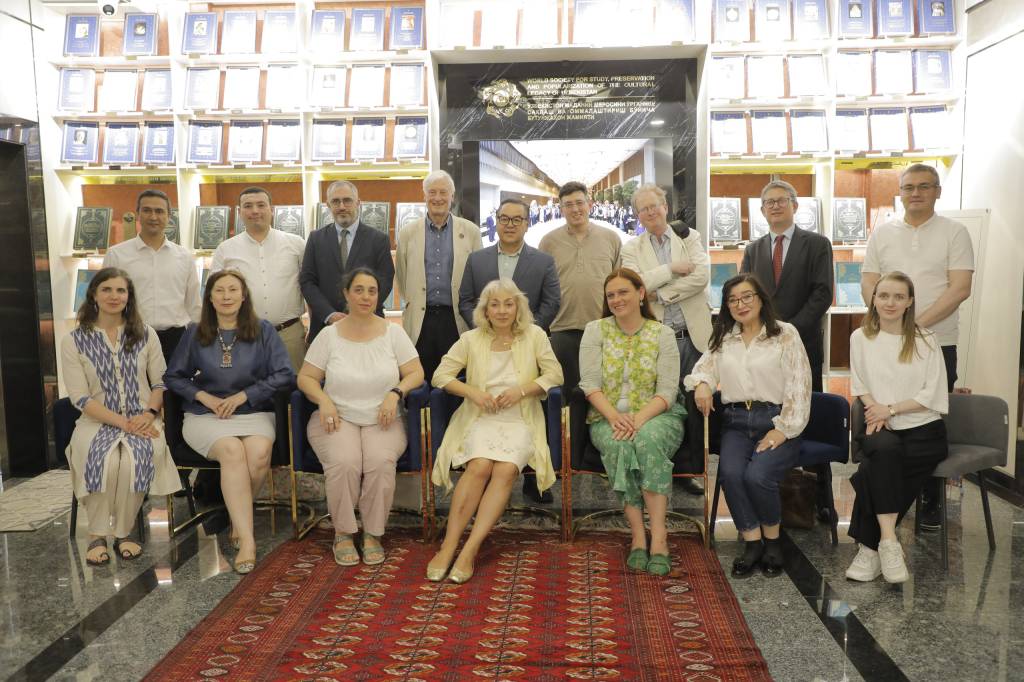
A scientific briefing was held at the office of the World Society for the Study, Preservation, and Popularization of Cultural Legacy of Uzbekistan (WOSCU) with leading scholars from Uzbekistan, the UK, Austria, and the Netherlands. The participants discussed prospects for joint research and publications in cultural heritage and strengthening international cooperation.
The researchers delved into unique studies in culture, history, and social projects that foster interaction between diverse cultural communities. The guests were introduced to the extraordinary 70-volume series “Cultural Legacy of Uzbekistan in World Collections”, the remarkable 20-volume “Architectural Epigraphy of Uzbekistan”, facsimile editions of manuscripts, gift editions, and captivating documentary films.
One of the key moments of the visit was getting acquainted with the large-scale projects being implemented in New Uzbekistan under the leadership of President Shavkat Mirziyoyev in cultural heritage preservation and scientific development. Dr. Firdavs Abdukhalikov, Chairman of WOSCU, presented these initiatives to international scholars and new directions for the World Society’s work.
“One of the main difficulties was establishing contacts with some foreign scientific institutions. Differences previously hindered this process in approaches to cultural heritage preservation and bureaucratic barriers. A breakthrough in this direction was made possible thanks to the persistence and determination of our country’s President, the activation of international partners, the WOSCU team, and the support of socially responsible businesses like Eriell Group, who share our commitment to preserving and studying Uzbekistan’s cultural heritage.
Today, during the scientific meeting with scholars and museum representatives, we not only drew attention to our projects but also secured the support of influential experts in Oriental studies and manuscript heritage. We hope our project will be enriched with new research and scientific discoveries. Established contacts will allow us to access unique artifacts and documents, significantly expanding our knowledge of Uzbekistan’s cultural heritage and preparing scientific publications and books valuable to specialists and the general public”.
Nicholas Kontovas, a specialist from the Bodleian Library at the University of Oxford, highlighted the substantial support given to science and culture in Uzbekistan.
“You are doing significant work. WOSCU has published several books about Cambridge’s collections. It would be wonderful if you could publish a book about the Bodleian Library’s collection, as we have 200 manuscripts written in Old Uzbek. There are also manuscripts in Arabic and Persian, and I would be happy to collaborate with WOSCU on their research and publication. The support for science and culture here is remarkable and rare in other countries. Promoting such large cultural projects is increasingly difficult, and I am delighted that Uzbekistan places such importance on its history and culture. This greatly enhances Uzbekistan’s reputation internationally”, he noted.
Dr. Firuza Melville, a member of the WOSCU Scientific Council, expressed deep gratitude for the opportunity to participate in every WOSCU congress.
She remarked, “I want to especially acknowledge the significant contributions of Bakhtiyor Fazylov, Chairman of the Board of Trustees, to the successful implementation of numerous WOSCU initiatives and projects. His efforts promote cultural and scientific exchange at the international level, enriching the global community with new knowledge and cultural achievements”.
Jaimee Comstock-Skipp, a researcher at the University of Oxford and a member of the World Society, stated, “I have been participating in international WOSCU congresses for several years. My specialization is in the study of Shaybanid manuscripts. I greatly respect the collaboration and international cooperation conducted by the World Society and am ready to contribute to studying the Shaybanid period in Central Asia. It is crucial to promote this unique project widely and distribute publications to as many scientific and educational institutions in the country and the world as possible”.
The guests noted the high level of projects in preserving cultural heritage being implemented in New Uzbekistan and expressed a desire to continue fruitful cooperation.
Nasiba Ziyodullayeva, UzA